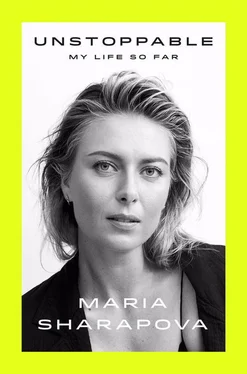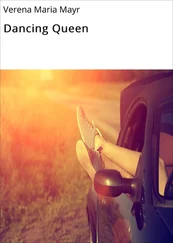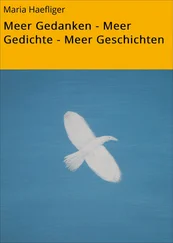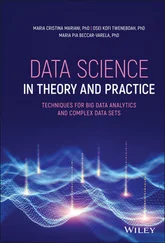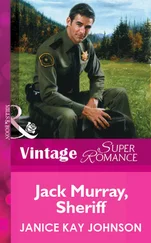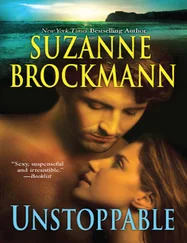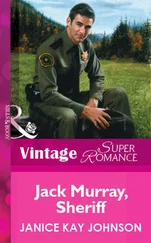When I asked my father about their escape from Gomel, he laughed. “It was a crazy, crazy time,” he said. “We went to your grandparents’ house because they lived in Siberia, which was as far away as we could get. We took the train, an old train jammed with people. Thirty-six hours from Gomel to Yekaterinburg, called Sverdlovsk in those days, then two more hours by air to Nyagan, close to the Arctic Circle.”
My father calls Nyagan “a shitty little town.” That’s where I was born, on April 19, 1987. Yuri was gone by then, having left for work as soon as my mother was settled. He was back in Gomel, celebrating Easter with his parents, when he learned that he was a father.
Yuri came to see me a few weeks later. That’s when he got his first good look at Nyagan, a brutal industrial outpost of apartment blocks and factories, and knew that he could never live there, nor go back to Gomel. He decided to make the best of the situation and take us to a place he’d always wanted to live: Sochi, a Black Sea resort situated between mountains and sea. Yuri had fallen in love with the place on a childhood vacation.
Sochi?
My grandparents thought he was crazy, but lent him some money anyway. He was able to trade our house in Gomel for a tiny little apartment in Sochi. We arrived there when I was two years old. Had we not moved to Sochi, I never would’ve taken up tennis. It’s a resort and tennis is part of its life. That made it different from the rest of Russia, where the sport was unknown. If you had to pick one event that made me a player, it’d be Chernobyl.
We still own that apartment. It’s on a steep side street, Vishnevaya (Cherry) Street, sixth floor, in the back of the building. When we came home, I would race up the stairs with the key, leaving my parents to trudge up the five flights behind me. I have such fond memories of the afternoons I spent there as a child, the intimate dinners, the funny conversations, the people coming and going, my grandmother sitting on the stairs, chatting entire evenings away. My earliest recollections are of looking out the window of that apartment at the boys and girls in the playground up the hill. My parents were very protective. They did not let me out much. Mostly, I was just at the window, watching other kids play.
From the start, my parents took different roles in my life. My father was practice and sports and competition—outside. My mother was school and letters and stories—inside. She made me copy the Russian alphabet again and again and again, working on each letter till it was perfect. She made me write stories and memorize Russian poems. Best was when she just let me read. Pippi Longstocking was my favorite. I dreamed about the world of the little girl, daughter of a wealthy sailor, with money in her pocket, doing whatever she wanted, just like a grown-up. She had a horse. And she had a monkey! That book took me to the place I wanted to live.
My grandparents would visit from Nyagan. I loved spending time with Grandma Tamara. I talked to her when I was working on this book—she remembers so much I can’t. She laughed when I asked about the day I nearly drowned. “There’s a simple explanation, which maybe you can understand better now,” she told me. “I was only forty years old when you were born. I really didn’t want to be called Grandmother. When you were three or four, we’d go to the beach. I’d swim a bit, then you’d go into the water and splash. Suddenly, I’d hear you screaming, ‘Grandmother! Grandmother!! Grandmother!!!’ And, you see, there were young men around on the beach, and I didn’t want them to know. So I pretended not to hear you. Later, I sat next to you and whispered: ‘Mashenka, don’t call me Grandmother in front of others!’ I changed you into clean, dry underwear, I remember this well, and began wringing out your swimming panties, and suddenly you go, ‘You’re not a grandmother! You’re a squeezer!’”
As soon as I was old enough to look after myself a bit, Yuri started taking me around. Wherever he went, I went. That’s why I was at the court that day, where I picked up a tennis racket for the first time. Riviera Park. For whatever reason, I had this ability. I could hit that ball against that wall for hours. It was not my skill people remarked on. It was my concentration—that I could do it again and again without getting bored. I was a metronome. Tick, tock. Tick, tock. I attracted a crowd. People stood around, watching. This happened day after day. It got to the point where Yuri felt he had to do something. Which is why, when I was four, he enrolled me in a tennis clinic for kids. That’s how I found my first coach, Yuri Yudkin, a playground legend, a vodka-soaked maestro. He’d been out in the world, the big world of tennis, so he knew a thing or two. He dazzled provincial Sochi. Tennis parents stood in line to hear his pronouncements or, better, let him appraise and coach their kids. A few locals had already made the big time, like Yevgeny Kafelnikov. My father enrolled me with Yudkin. He’d line you up the first day and watch you hit. If he paused, your heart leaped and you hit harder. He spoke to my father at the start and said that I seemed to be something special, unique. It was how my eyes tracked the ball, and the way I kept at it. Whether I developed into a player would depend on my toughness.
“Does Masha have it, or not? This is what we will find out.”
Maria is not my real name. I was christened Masha. But there is no good match for Masha in English, and soon after I arrived in America, people started calling me Marsha, which I hated—they connected me to the Brady Bunch!—so I got out in front of that and told people to call me Maria.
By toughness, Yudkin meant persistence, the quality that makes you lock in and focus when asked to do the same thing a million times. If you ask most kids to do something, they will do it once or twice, then get restless, shut down, and walk away. To be great at anything, Yudkin believed, you had to be able to endure a tremendous amount of boredom. That is, you had to be tough. Was I? Time would tell.
I was soon taking private lessons on the back courts. Yudkin was a genius at building those first strokes, and that’s everything. The basics. If you don’t get that right, you’re going to have problems. Like setting out on a long trip and your first step is in the wrong direction. At the beginning, it’s all you have: a simple forehand, a simple backhand. It’s all you have at the end, too. Yudkin hands me a racket. “What do you do?” He hands me a ball: “And what do you do now?” He sits on the side, watching. He says, “Yes, yes, no, no, no. Not flat like that, you have to put a loop in your swing, get under the ball.” He asks, “As your right hand does that, what’s your left hand doing?” He’d give me a simple task, have me do it again and again. And again and again. And again. He was building my stroke, but also developing my concentration. “Get tough, Masha.” The player who keeps working five minutes after everyone else has quit, who carries on late in the third set when the wind is blowing and the rain is coming down, wins. That was my gift. Not strength or speed. Stamina. I never got bored. Whatever I was doing, I could keep doing it forever. I liked it. I locked into each task, and stayed at it until I got it right. I’m not sure where that comes from. Maybe I wanted approval from Yudkin, or my father. But I think my motivation was simpler. Even then, I knew these tasks, this tedium, would help me win. Even then, I wanted to beat them all.
My father had become friendly with some of the other Sochi tennis parents, especially the father of Yevgeny Kafelnikov, a real hotshot back in the day. Yevgeny was one of the first stars of post-Soviet Russian tennis. He reached number one in the world, and won the French and Australian Opens. He was big and blond, handsome, a hero to a lot of us. I played his father one day for fun. Afterward, he gave me one of Yevgeny’s rackets. It was way too big. They cut it down and it still looked ridiculous, but I played with that racket for years. Sometimes I think it made me better, sometimes worse. It was like swinging a weighted baseball bat. It forced me into helpful positions and made me strong, yet its weight forced my strokes into awkward positions, creating some bad habits. But it’s all I had, so it was my only option.
Читать дальше
